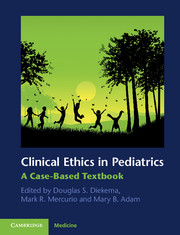Book contents
- Frontmatter
- Contents
- Contributors
- Preface
- Section 1 Core issues in clinical pediatric ethics
- Section 2 Ethical issues at the beginning of life: perinatology and neonatology
- Section 3 When a child dies: ethical issues at the end of life
- 18 End-of-life care: resolving disputes over life-sustaining interventions
- 19 Futility
- 20 Advance directives and DNR orders
- 21 The determination of death
- 22 Physician-assisted dying in children
- 23 The Groningen Protocol
- 24 Defining beneficence in the face of death: symptom management in dying children
- Section 4 Ethical issues posed by advances in medical technology and science
- Section 5 Children, public health, and justice
- Section 6 Special topics in pediatric ethics
- Index
- References
19 - Futility
from Section 3 - When a child dies: ethical issues at the end of life
Published online by Cambridge University Press: 07 October 2011
- Frontmatter
- Contents
- Contributors
- Preface
- Section 1 Core issues in clinical pediatric ethics
- Section 2 Ethical issues at the beginning of life: perinatology and neonatology
- Section 3 When a child dies: ethical issues at the end of life
- 18 End-of-life care: resolving disputes over life-sustaining interventions
- 19 Futility
- 20 Advance directives and DNR orders
- 21 The determination of death
- 22 Physician-assisted dying in children
- 23 The Groningen Protocol
- 24 Defining beneficence in the face of death: symptom management in dying children
- Section 4 Ethical issues posed by advances in medical technology and science
- Section 5 Children, public health, and justice
- Section 6 Special topics in pediatric ethics
- Index
- References
Summary
Case narrative
Carlos, age 8 months, has been in the intensive care unit, ventilator dependent with status epilepticus, almost continuously for the past 5 months. He has multifocal migrating epilepsy, with seizures originating from both hemispheres. His physicians have either ruled out all known causes of seizures or treated them empirically with no improvement. Control requires general anesthesia (propofol) or complete suppression of cortical function with barbiturate coma. The migratory multifocal origins preclude even radical surgical approaches that are sometimes considered, such as removing an entire cerebral hemisphere, or interrupting the corpus callosum. Experts from other major centers have been consulted and all agree his case is among the worst ever described, and that he has little or no prospect for recovery with meaningful neurologic function.
His single mother is insistent that everything be done to keep him alive. She does not trust the doctors and accuses them of wanting to kill Carlos because of cost concerns. She does not profess a religious faith. She seldom visits, and does not want to discuss the issue of withdrawing life-sustaining treatments any more. Carlos’ father is not involved and his maternal grandmother supports Carlos’ mother.
- Type
- Chapter
- Information
- Clinical Ethics in PediatricsA Case-Based Textbook, pp. 106 - 111Publisher: Cambridge University PressPrint publication year: 2011
References
- 2
- Cited by

